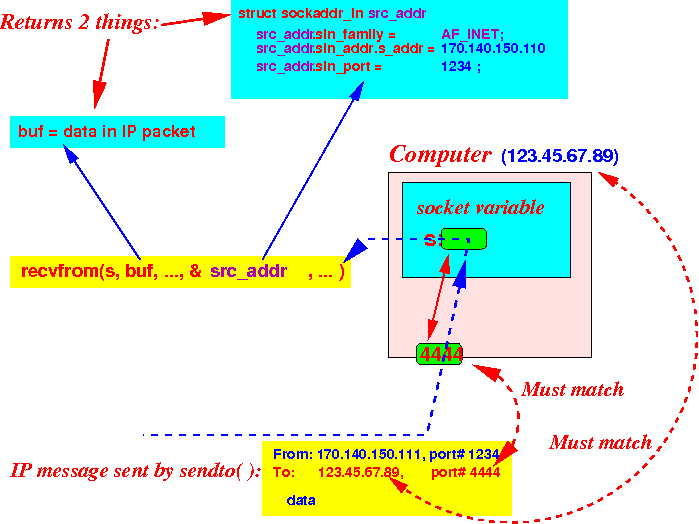- System call to
receive data
with UDP socket:
int recevfrom(int sock, void *buf, int len, // Receive buffer int flags, struct sockaddr *from, int *from_len); // Sender's network addr.
Parameter: sock = socket variable buf = pointer to user data buffer location (stores recv'd message) len = buffer size of "buf" flag = various flags (options) E.g., Set MSG_OOB bit for "out-of-band" (high priority) data from = IP address + Port number of the sender !!! from_len = length of the "from" structure
- Effect:
- If there is
no UDP message in the
receive buffer:
- The recvfrom( ) call will block.....
- Otherwise,
recvfrom( ) will:
- retrieves the next UDP message from (kernel's) receive buffer associated with the socket sock
Specifically:
- The entire UDP message will be stored into the buf variable
- The length of the UDP message will be returned in the len variable
- The sender's network address is returned in the from variable
Graphically:

- If there is
no UDP message in the
receive buffer:
- Very important fact:
- The network address (= IP addr + port#)
of
the sender is
return in:
- The variable from
Therefore:
- The receiver
can send back
a reply using:
sendto( s, reply, len, 0, from, from_len);
- The network address (= IP addr + port#)
of
the sender is
return in:
- Return value:
(of recvfrom( ))
Error: returns -1 Otherwise: returns the number bytes stored in buf
Example:
/* ======================================== Assume we have done these already: create socket s bound s to a port ======================================== */ char line[1000]; /* User buffer to receive data */ struct sockaddr_in src_addr; /* Used to store sender's address */ int length; /* Length of the sockaddr_in data type */ /* --------------------------------------------------- Set up the length to tell recvfrom how much space it can write into the "src_addr" variable --------------------------------------------------- */ length = sizeof(src_addr); /* Length of the src_addr variable */ /* ---------------------------------------------------------- Receive the next message into the variable "msg" The sender of the message will be recorded in "src_addr" (You can use "src_addr" to reply to the sender !) ---------------------------------------------------------- */ recvfrom( s, line, 1000, 0 /* flags */, (struct sockaddr *)&src_addr, &length);
- Example Program:
(Demo above code)

- Prog file: click here
How to run the program:
- Right click on link(s) and
save in a scratch directory
- To compile: cc -o udp4-r1 udp4-r1.c
- To run:
udp4-r1 My-IP-address my-Port#
- use My-IP-address = 0 for wildcard IP address
- You need to use the same port# in the send program above to send message to this program
- You can send a
reply back to
the sender using the
src_addr variable
from the
recv_from( ) call:
/* ---------------------------------------------------------- Receive the next message into the variable "msg" The sender of the message will be recorded in "src_addr" (You can use "src_addr" to reply to the sender !) ---------------------------------------------------------- */recvfrom( s, line, 1000, 0 /* flags */, (struct sockaddr *)&src_addr, &length); .... /* -------------------------------------------------- Program can send reply to sender using "src_addr" -------------------------------------------------- */ sendto( s , buf, length_of_buf, flags, (struct sockaddr *)&src_addr, &length);